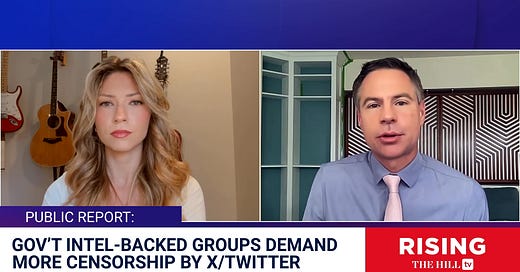Yesterday, three judges on the Fifth Circuit Court ruled that the Biden administration had likely violated the First Amendment by demanding censorship of Facebook and other social media platforms. It was a major victory for all of us who exposed government censorship and a defeat for those who claimed that the behaviors of people in the Biden White House were just government officials “jawboning,” trying to persuade, and weren’t coercive. The court ruled that the demands were indeed coercive because they included direct and implied threats that got action from the companies.
But the ruling also showed the limits of the First Amendment to protect free speech online. The judges ruled that the Cybersecurity and Infrastructure Security Agency (CISA) of the Department of Homeland Security had likely not violated the First Amendment in creating an elaborate system for “flagging” content for Facebook, Twitter, and other social media platforms to censor. The court suggested that such mass flagging operations may be constitutionally protected free speech, at least if done right.
We believe that the way CISA mass-flagged so-called “Covid misinformation” in 2021, through its partnership with “The Virality Project,” created by Stanford Internet Observatory and others, was a government infringement on freedom of speech. Through such mass flagging, CISA indirectly demanded that Twitter and Facebook censors “often true” information about vaccine side effects. We believe that, with Biden simultaneously threatening the Section 230 legal status of the social media platforms, having CISA’s partners make their demands constituted coercion.
But we also recognize that the court was saying that such mass flagging by “government partners” could be constitutionally protected if it did not involve coercion or, on the flip side, any incentive to cooperate. The First Amendment prevents the government from “abridging” or limiting speech. It doesn’t prevent government officials from telling publishers, whether of books, news articles, or social media posts, that, in their opinion, they shouldn’t be publishing those books, articles, or social media posts. The line the Circuit Court wants to draw is on relatively direct and obvious coercion, not jawboning.
Whether or not the Supreme Court decides to hear the case and draw the line somewhere else, the ruling points to the need for Congress to take action to protect freedom of speech from the alliance of government-funded NGOs and advertisers that forced Facebook to agree to wider censorship, and have reduced advertising revenue to X/Twitter by 60-70%.
It should not be up to ADL any more than it should be up to Joe Biden to decide what we are allowed to say or read online. It is a gross restriction on our freedom of speech for ADL to be able to force Facebook and X/Twitter to censor disfavored voices and views, even if it is not a violation of the First Amendment.
The obvious solution is for Congress to require that social media companies allow users to moderate their own content in exchange for Section 230’s sweeping liability protections, which allow them to exist.
It’s easy to see how this would work.





